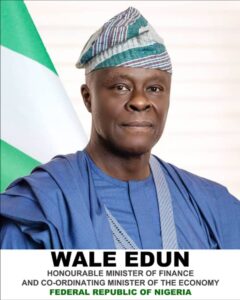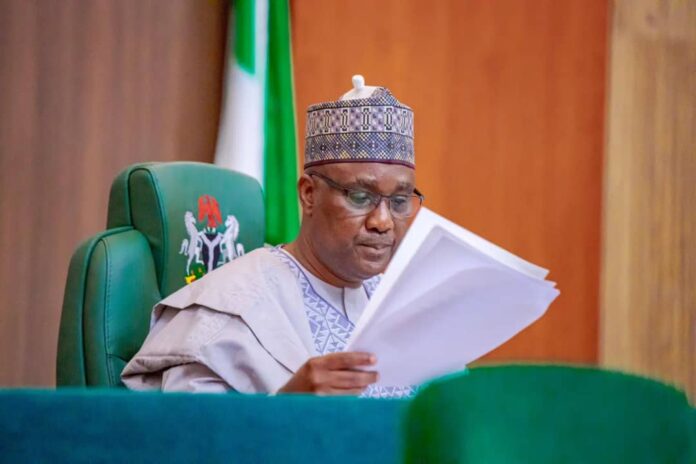The Speaker of the House of Representatives, Hon. Tajudeen Abbas has described Nigeria’s N149.39 trillion ($97 million) debt as not only alarming but one that has exceeded the country’s legal threshold, which now poses a major threat to fiscal sustainability.

Abbas who spoke on Monday at the opening of the 11th Annual Conference and General Assembly of the West Africa Association of Public Accounts Committees (WAAPAC), organised by the House of Representatives Public Accounts Committee in Abuja, with the theme: “Strengthening Parliamentary Oversight of Public Debt.”
He said Nigeria’s total public debt rose to N149.39 trillion (about US$97 billion) in the first quarter of 2025, up from N121.7 trillion the previous year.
“As of the first quarter of 2025, Nigeria’s total public debt stood at N149.39 trillion, equivalent to about US$97 billion. This represents a sharp rise from N121.7 trillion the previous year, underscoring how quickly the burden has grown. Even more concerning is the debt-to-GDP ratio, which now stands at roughly 52 per cent, well above the statutory ceiling of 40 per cent set by our own laws”, Abbas said.
Abbas, who was represented by the House Leader, Prof Julius Ihonvbhere, said this has breached the nation’s debt limit and signals the strain on fiscal sustainability.
According to the speaker, the development highlights the urgent need for stronger oversight, transparent borrowing practices, and a collective resolve to ensure that tangible economic and social returns match every naira borrowed.
The speaker warned that across Africa, debt has become a structural crisis, with several countries spending more on servicing loans than on healthcare and other essential services.
He cautioned that many African countries are already spending more on debt servicing than on healthcare and other essential services, adding that Nigeria must avoid a similar situation.
To address fiscal risks, the Speaker announced plans to establish a West African Parliamentary Debt Oversight Framework under WAAPAC.
The initiative will harmonise debt reporting across the sub-region, set transparency standards, and equip parliaments with data to scrutinise borrowing.
The speaker cautioned that borrowing should be targeted at infrastructure, health, education, and job-creating industries, warning that reckless debt that fuels consumption or corruption must be exposed and rejected.
“Our oversight must also be people-driven. Major borrowing proposals should be subject to public hearings, and simplified debt reports must be made available to the public. Citizens have the right to know, and we have the duty to inform,” he stated.
In his contribution, Senate President Godswill Akpabio urged West African countries to strengthen the constitutional backing for public accounts and finance committees, ensuring transparency, accountability, and sustainability in public debt management.
Akpabio stated that unchecked debt can jeopardise the future of citizens and undermine democracy across the sub-region.
Akpabio who was represented by Senator Osita Izunaso, described parliamentary oversight as indispensable to fiscal stability, noting that when debt is well managed, it serves as a strategic instrument for financing infrastructure, growth, and sustainable development.
However, Nigeria’s Minister of Finance, Wale Edun, projected optimism and insisted that Nigeria’s debt profile was manageable.
Edun painted a more reassuring picture, declaring that Nigeria was turning the corner under President Bola Tinubu’s reforms.
“Nigeria is turning the corner. The reforms are delivering measurable impact in terms of investor confidence, reduced spending on fuel imports, greater energy self-sufficiency, and value addition in our economy,” Edun said.
He said the country’s debt service-to-revenue ratio dropped to about 60 per cent in 2024, while the debt-to-GDP ratio stood at 38.8 per cent, a level he described as comfortable compared to global benchmarks.
Revenues, he added, rose by 34.7 per cent in the first half of 2025.
The minister acknowledged that Nigeria, like many countries in West Africa, faces significant fiscal challenges, including elevated debt service costs, constrained revenues, and rising demands for public spending.
He said Nigeria achieved the gains through tough but necessary policy choices such as the removal of fuel subsidies, liberalisation of the exchange rate, and the roll-out of a comprehensive tax reform programme aimed at boosting efficiency, simplifying compliance, and raising Nigeria’s tax-to-GDP ratio over time.
The alarm raised by the National Assembly comes barely weeks after it approved President Bola Tinubu’s external borrowing plan of over $21 billion for the 2025–2026 fiscal cycle, including $21.19 billion in foreign loans, €4 billion, ¥15 billion, a $65 million grant and domestic borrowing of about N757 billion.
The approval, recommended by both the House and Senate Committee on Local and Foreign Debt, also included provisions to raise $2 billion through a foreign-currency-denominated instrument in the domestic market.
He highlighted the structure of Africa’s debt, noting that 35 per cent is owed to Western private lenders, 39 per cent to multilateral institutions such as the IMF and the World Bank, 13 per cent to bilateral creditors, and 12 per cent to China
According to him, these reforms are essential for creating a predictable macroeconomic environment that encourages private investment, which accounts for about 90 per cent of economic activity.
“Government’s role is to act as a catalyst, not to crowd out the private sector. With the right fiscal discipline, we can unlock opportunities and ensure inclusive growth that lifts millions out of poverty,” he said.
On Nigeria’s fiscal direction, the minister outlined priorities, including debt transparency, growth-enhancing borrowing, domestic revenue mobilisation, and prudent budgeting within the limits set by the Fiscal Responsibility Act.
He said the government is committed to project-linked borrowing that yields direct returns and avoids reliance on money-printing or unsustainable financing.
Edun also drew attention to global headwinds, such as shrinking development aid, reduced world trade, and rising international interest rates, that have made fiscal management more difficult for developing economies.
He said these challenges underscore the need for African countries to be more self-reliant by embracing reforms, technology, and digitisation to strengthen revenue generation.
The minister emphasised that parliamentary oversight is central to maintaining fiscal discipline.
He urged lawmakers to hold governments accountable for borrowing and spending decisions, insisting that transparency and accountability must underpin every fiscal framework.
“A sound fiscal framework is not just the responsibility of the executive; it demands partnership, leadership, and rigorous oversight from parliamentarians such as you, especially public accounts and finance committees,” Edun said.
The Minister described Nigeria’s fiscal trajectory as a turning point, with reforms providing the foundation for stability, competitiveness, and inclusive growth.
Chairman of the House of Representatives Committee on Public Accounts, Rep. Bamidele Salam disclosed that the committee recovered over N200 billion in lost revenues for the federal government within the last year.
Salam said the recoveries were part of a series of reforms aimed at strengthening fiscal accountability in Nigeria.
He described the gathering, which Nigeria is hosting for the first time since WAAPAC’s creation in 2009, as timely, given the rising debt burden across Africa.




